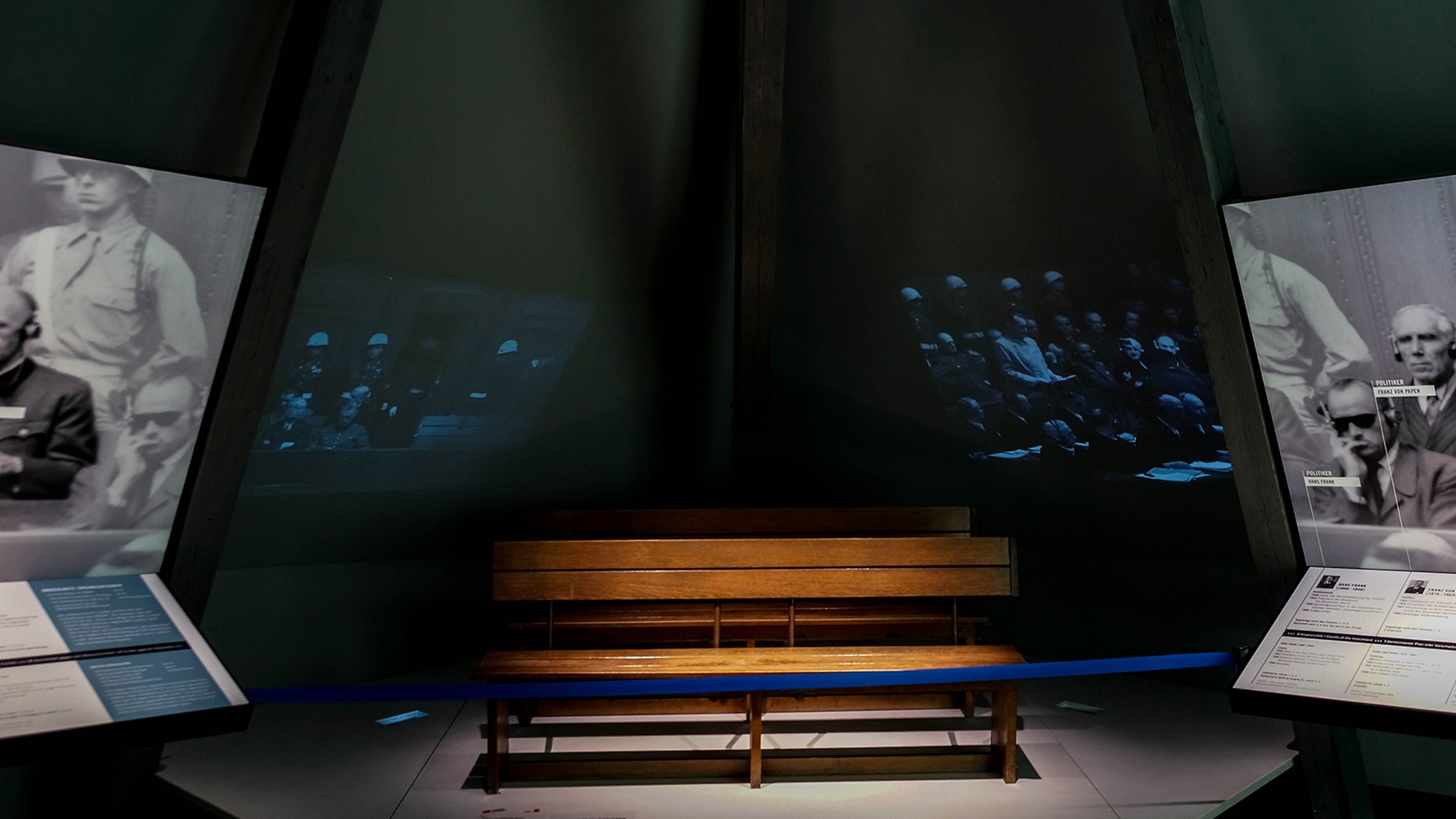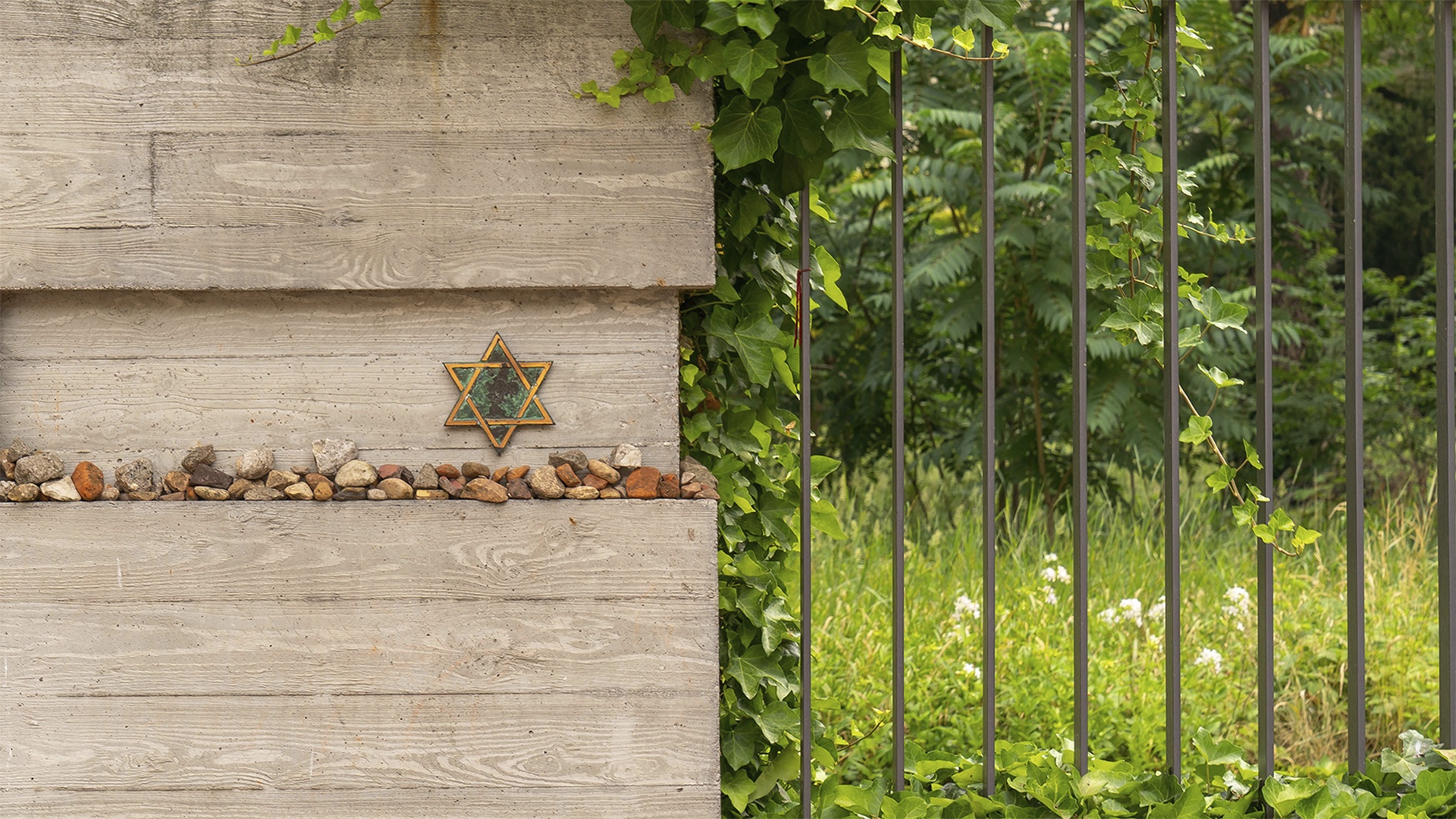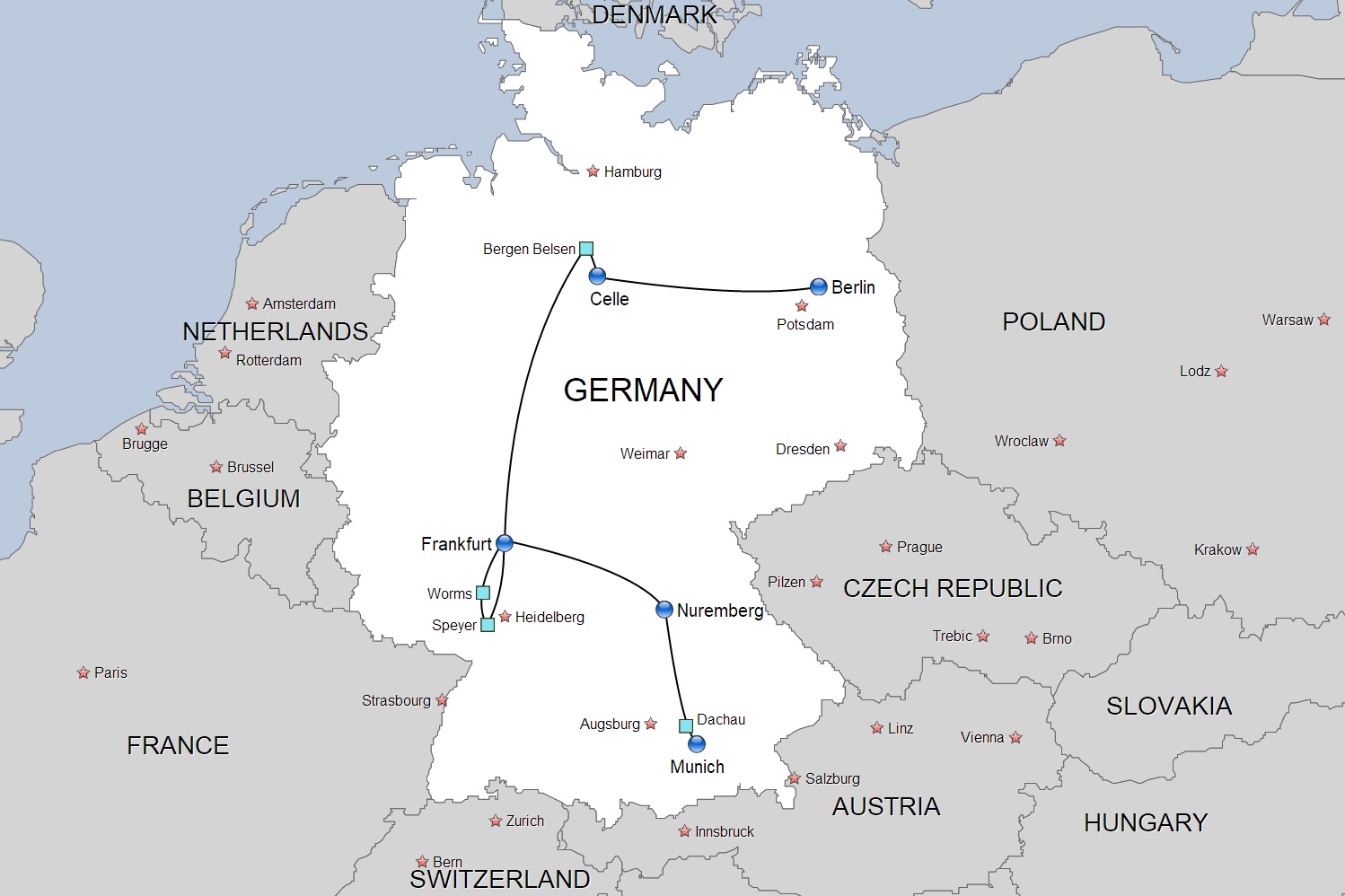Germany
Jewish tours to Germany – Roots, Ruins and Renaissance
For the educated Jewish traveler, few places can be more significant historically than Germany, for which “Ashkenazi” Jews are named. Jews have lived here for centuries. The great scholar, Rashi – without whom understanding the Torah would be near to impossible – lived in medieval Worms, Germany. At the other end of the spectrum, Berlin, currently the modern city in Europe, represents a developing story in German-Jewish relations. Today, it boasts a new Holocaust Monument that rivals the Vietnam Memorial in Washington, as well as a world-class Jewish Museum in the most central part of the city.
Both our Jewish Heritage tours of Germany are “think-pieces” about the richness of our past, the horrors of the Holocaust, and the re-emergence of the Jewish soul in this part of the world. In this longer of the two tours, you will delve even more deeply into these topics, tracing our history from the early Middle Ages to the insidious rise of the Third Reich in Munich and Potsdam, and into present-day Germany, typified by its cosmopolitan capital, Berlin.
EXPLORE OUR JEWISH TOURS TO GERMANY AND DENMARK
EXPLORE OUR JEWISH TOURS TO GERMANY AND POLAND
Tour Information
Jewish tours in Germany
Munich – Dachau – Nuremberg – Frankfurt – Speyer – Worms – Bergen Belsen – Celle – Berlin
Duration: 10 days
2026 Departure:
July 10 – July 19
Price Per Person:
$5,851 Land only
$1,390 Single supplement
Accommodations:
Munich, 2 nights
Excelsior by Geisel Hotel
Nuremberg, 1 night
Park Plaza Hotel
Frankfurt, 2 nights
Westin Grand Hotel
Celle, 1 night
Furstenhof Hotel
Berlin, 3 nights
Telegraphneamt Hotel
Included Services:
Deluxe Hotels with central locations
Deluxe air-conditioned coaches
In-depth and relevant sightseeing program including Jewish history and sites
All entrance fees as per the itinerary
Professional full time tour director throughout the tour
All taxes and fees
These departures are guaranteed with 10 travelers only.
Pre/Post Tours:
We can accommodate pre/post tour arrangements in conjunction with this departure.
Passport and Visa:
No visa is required for this tour. Always make sure your passport is valid for at least 6 months after the tour ends.
Europe is scheduled to introduce the ETIAS entry authorization in 2026.
Not Included:
R/T flights from the USA.
Tips to driver & guides.
Travel insurance.
All expenses of personal nature.
Itinerary
Day 1 Friday Arrival in Munich
Upon arrival at Munich Airport, transfer to the hotel in the city center. In the early afternoon, embark on our historic journey through Germany, beginning in the city where the Nazi Party was founded in 1919. What started as the creation of a small local movement by a locksmith was soon overtaken by Hitler, who transformed Munich into the breeding ground of his poisonous and hateful ideology. The first stop is the Ohel Jakob Synagogue, part of the new Jewish Center that once again anchors Munich’s Jewish community – a powerful symbol of renewal in the very city that once sought to erase Jewish life. Later, continue to the Olympic Park, where we pause at the 1972 Munich Massacre Memorial to honor the memory of the 11 Israeli athletes murdered by terrorists, a moment when Jewish tragedy once again pierced modern German history. Return to the hotel in the late afternoon. Dinner. Excelsior by Geisel Hotel.
Day 2 Saturday Munich
Today, explore the historic sites of Munich’s Old Town, tracing the insidious rise of Nazism. Begin at Feldherrnhalle on Odeonsplatz, where Hitler’s attempted putsch of 1923 (Beer Hall Putsch) was stopped, a failure that later became mythologized by the Nazis. Nearby, see the Haus der Kunst, built in the 1930s as a showcase for “Great German Art,” reflecting the regime’s twisted vision of culture. Walk across Residenz Park to the War Memorial, before arriving at Ludwig Maximilian University. Here we find the White Rose Monument, honoring Hans and Sophie Scholl and their fellow students who dared to resist the Nazi machine – paying for their courage with their lives. Continue to the National Socialist Documentation Center, built near the site of the former Nazi Headquarters at Königsplatz. This museum, with its stark architecture and detailed exhibits, confronts Munich’s role as the “Capital of the Movement” and turns the heart of Nazi power into a place of education. Return to the hotel or explore Munich on your own. Excelsior by Geisel Hotel.
Day 3 Sunday Munich – Dachau – Nuremberg
This morning, begin with a visit to to Dachau, the first concentration camp on German soil. Established in 1933, Dachau became the model for all camps that followed. Here, we visit the grounds, the museum, and the Memorial Chapel, reflecting on the horrors of turning a former ammunition factory into a place of pure terror. The words “Never Again” take on profound meaning as we walk where so many lives were destroyed. Later, drive to Nuremberg, once the stage of Nazi propaganda rallies, and the site of postwar justice. Begin at Zeppelinfeld, the massive parade grounds where Hitler orchestrated his rallies to project an illusion of strength and unity. Nearby, the unfinished Kongresshalle, once planned as a Nazi congress building, today houses the Documentation Center, exposing the propaganda, manipulation, and destruction that defined the Nazi atrocities. Continue to the Place of Justice and see the courtroom 600, site of the historic Nuremberg Trials, where Nazi leaders were held accountable for crimes against humanity. Visit the courtroom and the Memorial exhibition. Later, check in at the hotel. Park Plaza Hotel.
Day 4 Monday Nuremberg – Frankfurt
This morning, drive to Frankfurt, Germany’s modern financial hub, where gleaming skyscrapers rise above the historic riverfront. In the afternoon, visit the Westend Synagogue and continue to the Old Town of the city. Here, visit the intriguing Judengasse Jewish Museum and the adjacent old Jewish Cemetery, one of the oldest in Europe. On its walls are over 11,000 plaques bearing the names of deported Jews, a silent testimony to a vanished community. Check in at the hotel in the late afternoon. The remainder of the day at leisure. Westin Hotel.
Day 5 Tuesday Frankfurt – Speyer – Worms – Frankfurt
Today is devoted to Ashkenazi history with an excursion to two of the Shum cities, Speyer and Worms – designated UNESCO World Heritage Sites in 2021. In Speyer, visit the Jewish Museum and the extraordinary 11th-century Mikveh, whose flowing waters once served a thriving medieval community. Continue to Worms, forever linked to the great Torah commentator Rashi, who studied and taught here in the 11th century. Tour the restored Synagogue complex, the Rashi House, and the Holy Sands Cemetery, where countless Jewish scholars rest. Here, one can sit on the Martin Buber Bench offering incredible view of the old Jewish cemetery and the great cathedral – two faiths facing each other through time. Later, return to Frankfurt. Westin Hotel.
Day 6 Wednesday Frankfurt – Bergen-Belsen – Celle
Depart Frankfurt and drive north. Visit Bergen-Belsen, a camp etched into Jewish memory. Originally a prisoner-of-war site, it became a place of starvation, disease, and death. Unlike Auschwitz, it had no gas chambers; here, neglect itself became a weapon. Among its victims were Anne Frank and her sister Margot. After liberation, Bergen-Belsen became one of the largest Displaced Persons camps, where survivors rebuilt their shattered lives. Today, the museum and memorial preserve both tragedy and resilience. Continue to Celle, a beautiful timber-framed towns. Remarkably, its small synagogue survived the Kristallnacht, blending into the half-timbered houses around it. Visit the 300-year old Synagogue in the heart of the city. Dinner. Furstenhof Hotel.
Day 7 Thursday Celle – Berlin
This morning, travel to Berlin’s suburb of Wannsee, where the January 1942 Wannsee Conference was chaired by Reinhard Heydrich, the chief architect of the “Final Solution.” Fifteen Nazi officials from the SS, Nazi Party, and ministries met here – not to decide whether to kill the Jews, but to coordinate the machinery of genocide across Europe. A short walk takes us to the villa of Max Liebermann, one of Germany’s Jewish painters, shunned and erased by the Nazis in the 1930s, now restored to honor his memory. Continue to Track 17 at Grunewald Station, from which Berlin’s Jews were deported until March 1945. Late afternoon, arrive in the former Jewish Quarter in Berlin and check in at the hotel. Telegraphneamt Hotel.
Day 8 Friday Berlin
This morning, explore the neighborhood around Oranienburger Strasse. Before the Shoah, this area was vibrant with Jewish life. See the outside of theNeue Synagogue; destroyed by the Nazis, its gilded dome still gleams as a symbol of hope. Continue via Hackescher Markt and Hofe to the Old Jewish Cemetery, Otto Weidt’s Workshop, and the Rosenstrasse Memorial for the brave women who protested in 1943. Travel past the Brandenburg Gate to the Memorial to the Murdered Jews of Europe and the Topography of Terror, the former headquarters of the Gestapo. On the way back, visit the Empty Library at Bebelplatz, memorializing the burning of thousands of books in May 1933. In the evening, optional Shabbat service and Shabbat Dinner with the community at the Neue Synagogue, steps from our hotel. Telegraphenamt Hotel.
Day 9 Saturday Berlin
This day is devoted to the Jewish Museum of Berlin, one of the most extraordinary Jewish museums in the world. Designed by Daniel Libeskind, the building itself is an emotional journey: voids, angles, and disorienting spaces reflect the ruptures of Jewish life in Germany. Its exhibitions tell the story of two millennia of Jewish presence – from medieval merchants to Enlightenment philosophers, from Mendelssohn to the Shoah, and into today’s revival. After the visit, enjoy the remainder of the day to explore Berlin on your own, discovering its cosmopolitan, multicultural energy. Telegraphneamt Hotel.
Day 10 Sunday Berlin – Home flights
After breakfast, transfer to the airport for return flights. Leave Germany with a deeper understanding of both the darkest chapters of Jewish history and the remarkable resilience of Jewish life that continues to endure.








